ECZEMA IN CHILDREN
WHAT IS ECZEMA?
Eczema is a common skin problem seen in many children, affecting about 1 in 10 children.
Eczema, also known as atopic dermatitis, often starts in early infancy. It is characterised by dry, red and itchy skin. It is usually a long-term condition that can get worse from time to time and subside as children get older.
If your child suffers from eczema, it is important to know what you can do to relieve the symptoms and the types of eczema treatment that are available for your child.
SYMPTOMS OF ECZEMA
What are the symptoms of eczema?
- Dry, itchy skin is the main symptom
- Redness, scales, bumps that can leak fluid or become crusty
Symptoms can flare up from time to time, and may be more noticeable at night.
Symptoms of dermatitis in infants, babies, toddlers and children may vary.
What are the symptoms of eczema in babies?
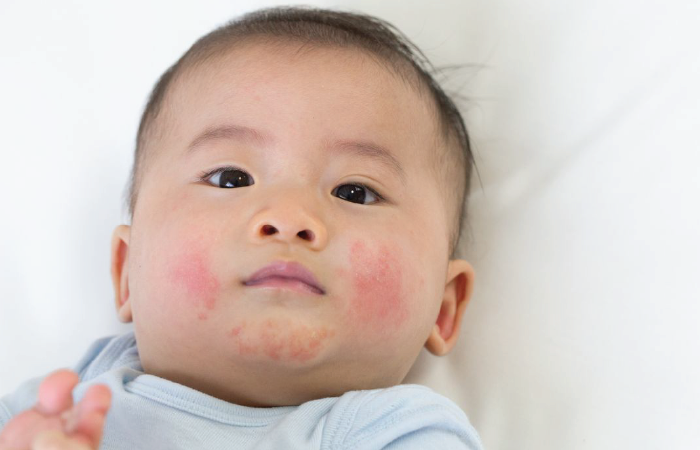
For babies, eczema shows up as red and dry patches, which usually start on the scalp and face. Eczema can appear on the cheeks, forehead, as well as around the mouth of babies.
What are the symptoms of eczema in infants?
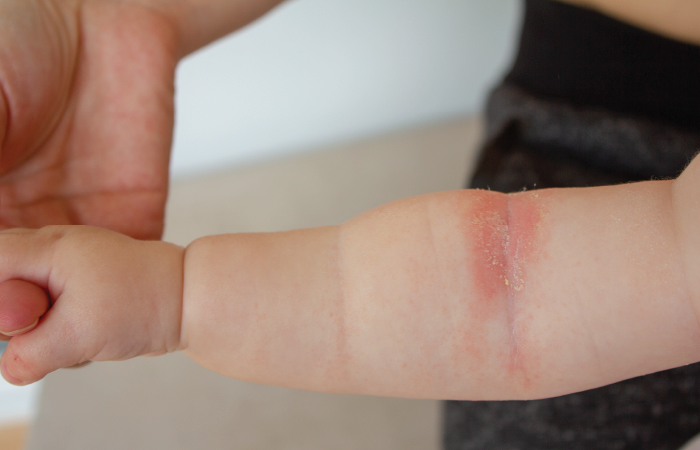
What are the symptoms of eczema in toddlers?
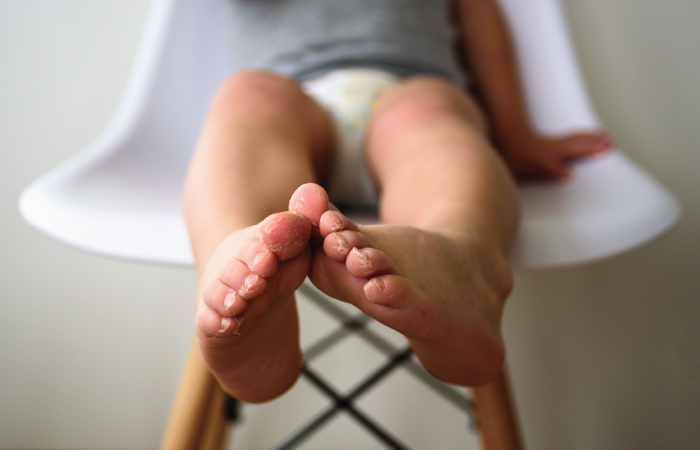
Eczema in toddlers can be most commonly found in the wrists, ankles and hands, knee creases, elbow, and around the mouth and eyelids. Depending on the type of eczema that a toddler has, the appearance of eczema can vary.
The symptoms of eczema in toddlers include, but are not exhaustive:
- Dry, itchy skin
- Scaly and rough skin
- Red patches with small bumps
What are the symptoms of eczema in children?
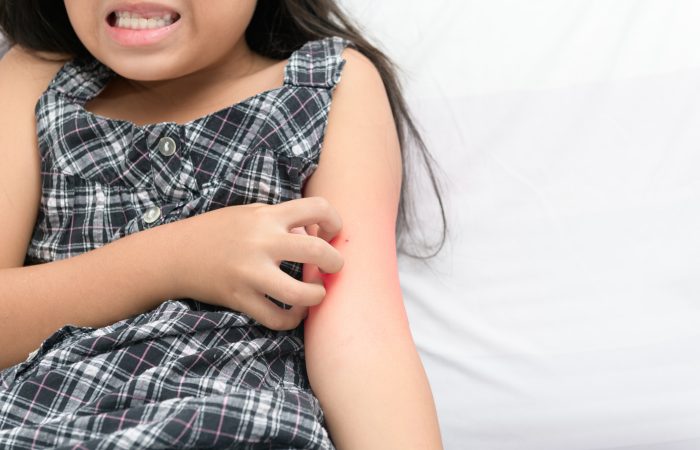
In younger children below 2 years old, eczema tends to start on the face, scalp, neck and body. In older children, eczema can appear in the creases of the elbows and knees as well as the wrists, ankles and buttocks. It tends to worsen during illnesses like a cough or a cold, in hot weather or dusty environment.
In older children, the rash usually occurs on the inner elbows, inner wrists and ankles, as well as behind the knees. This usually causes the skin to become drier and scalier, and possibly thicker and scarred from the scratching.
FREQUENTLY ASKED QUESTIONS ABOUT ECZEMA
What causes eczema?
The exact cause of eczema is not known. A person’s genetics and environment tends to play a role in eczema. When something outside the body triggers the immune system, skin cells do not react as they should, causing flare ups.
There is also a tendency for those with a family history of allergic conditions such as asthma and allergic rhinitis to develop eczema as well.
Some common triggers of eczema include:
- Heat and sweating
- Dry skin
- Irritants
- Allergens (e.g. dust, food allergies)
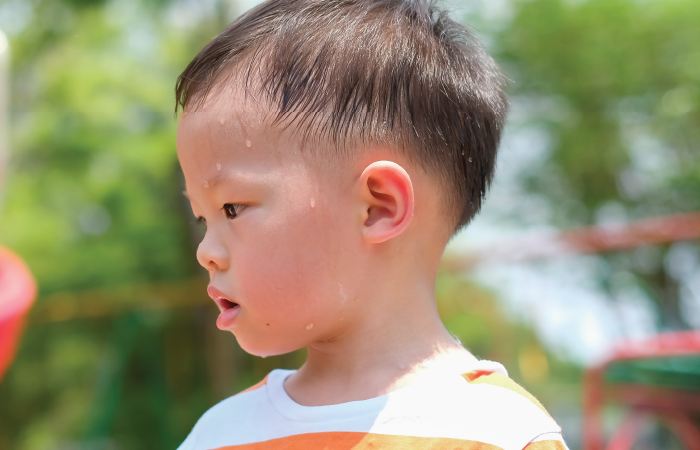
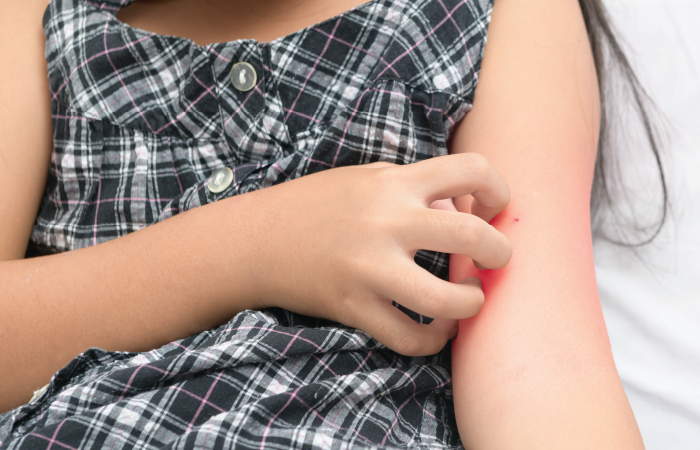
What are the eczema treatments for children?
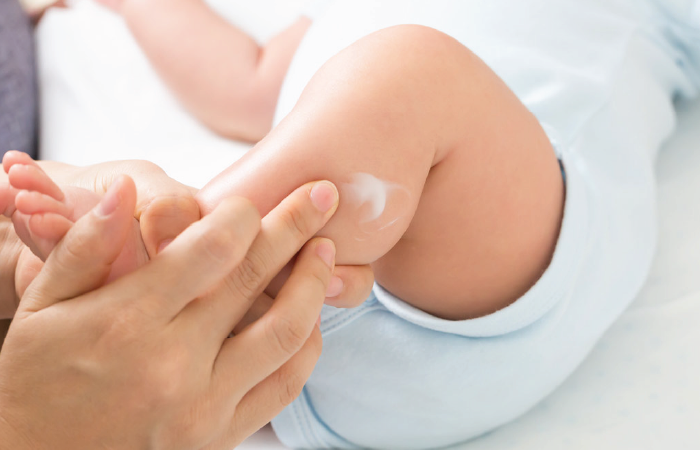
There is no cure for eczema. However, there are treatments that can help with the symptoms. Some are topical and applied to the skin, such as moisturisers which keep the skin from getting dry, or corticosteroids (steroid creams or ointments), which helps to ease the inflammation of skin. Others include medications taken by mouth, such as antihistamines. Some children do outgrow eczema, with it going away by age 4. However, some children may continue to have dry, sensitive skin as they grow up, even into adulthood.
HOW CAN PARENTS HELP THEIR CHILDREN WITH ECZEMA?
What can you do to soothe your child's eczema?
There is no cure for eczema, but the following measures can help relieve itching and prevent new outbreaks:
- Use a cleanser that is mild and gentle on the skin
- Use moisturiser liberally and frequently on the affected areas
- Bathing time should be short and with lukewarm water, and followed soon by application of moisturiser
- Maintain comfortable levels of air humidity and temperature in your home
The doctor or paediatrician may prescribe a steroid-based cream for severe flare-ups of eczema.
What can you do to prevent eczema in babies and children?
Though the exact cause of dermatitis is unknown, you can prevent flare-ups by doing the following:
- Discourage scratching by using mittens in young babies and keeping fingernails trimmed
- Avoid using harsh detergents and cleansers
- Avoiding allergens like house dust mites or substances known to worsen the condition
Ways to reduce house dust mites include:
- Avoid keeping plush toys
- Washing bedding sheets in warm (>60°C) water weekly
- Cleaning the air conditioner filter weekly
When should your child visit the clinic and seek medical treatment for eczema?
- If your child’s eczema worsens despite intensive moisturising
- When there are suggestions of secondary skin infection like intensive redness and itch, yellow discharge from the skin, fever and swelling around the site

Dr Alison Joanne Lee
Paediatric (Allergy & Immunology)
SBCC Baby & Child Clinic
Our specialist
Dr Alison Joanne Lee is a Paediatrician with a special interest in Allergy and Immunology. She was formerly an associate consultant at the Division of Allergy and Immunology, Department of Paediatrics, National University Hospital and is still currently a Visiting Consultant. She also has prior experience working in the Children’s Emergency as an Associate Consultant.
Dr Lee finds joy in caring and providing individualised treatment plans for children with eczema, food allergies, asthma and allergic rhinitis.










